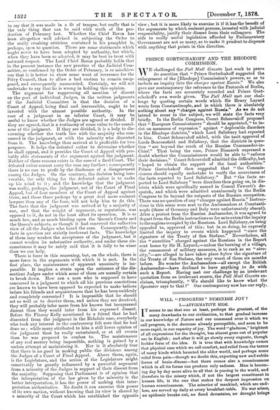PRINCE GORTSCHAKOFF AND THE RHODOPE COMMISSION.
W/E challenged the Pall Mall Gazette last week to prove its assertion that " Prince Gortschakaff suggested the enlargement of the [Rhodope] Commission's powers, so as to include an inquiry into the charges against Russia." We also gave our contemporary the reference to the Protocols of Berlin, where the facts are accurately recorded and Prince Gort- schakoff's own words given. The Pall Mall met our chal- lenge by quoting certain words which Sir Henry Layard wrote from Constantinopleoind in which there is absolutely nothing about any " charges against Russia." As we do not intend to recur to the subject, we will state the facts very briefly. In the Berlin Congress, Count Schouvaloff proposed that " European Commissioners " should be appointed," to in- sist on measures of -repression" against " deplorable disorders in the Rhodope districts," which Lord Salisbury had reported to him. Count Schouvaloff added, with the tacit approval of Lords Beaconsfield and Salisbury, that the districts in ques- tion " are beyond the reach of the Russian Commander-in- Chief." That being the case, Prince Bismarck expressed a doubt whether the Commissioners would be able to " enforce their decisions." Count Schouvaloff admitted the difficulty, but " hoped to obtain the support of the local authorities." Prince Gortschakoff then suggested that " the Commis- sioners should equally undertake to verify the correctness of the facts reported to Lord Salisbury." But " the facts re- ported to Lord Salisbury "were disorders then going on, in dis- tricts which were specifically named in Consul Fawcett's de- spatch, and which were admitted unanimously in the Berlin Congress to lie beyond the outposts of the Russian occupation. There was no question of any " charges against Russia." Instruc- tions in this sense were sent to the Ambassadors at Constanti- nople (those of Germany and Italy were unfortunately absent). After a protest from the Russian Ambassador, it was agreed to depart from the Berlin instructions so far as to extend the inquiry to the regions occupied by the Russians. Lord Salisbury, on being appealed to, approved of this; but in so .doing, he expressly limited the inquiry to events which happened "since the signature of the Treaty of San Stefano." Nevertheless, all the " atrocities" charged against the Russians in the Report sent home by Sir H. Layard,—unless the burning of a village, the commonest of military measures, is to rank as an " atro- city,"—are alleged to have taken place before the signature of the Treaty of San Stefano, the very worst of them six months before. No wonder the Ambassadors—all except the British Ambassador—have declined to have anything .to do with such a Report. Having met our challenge by an irrelevant quotatipn from an irrelevant source, the Pall Mall Gazette ex- claims, triumphantly, " We should like to know what the Spectator says to that ?" Our contemporary now has our reply.






































 Previous page
Previous page